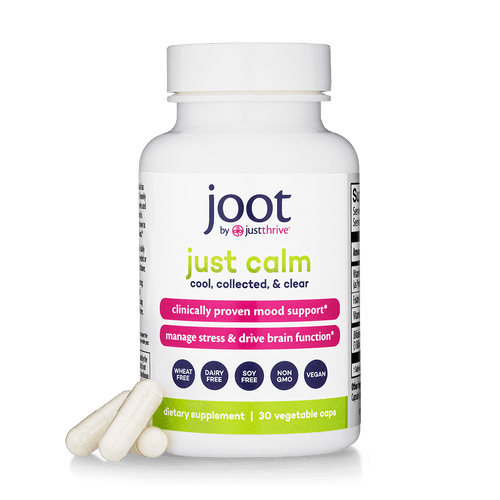This blog has been updated for quality and relevancy on September 23, 2025.
Your heart starts beating very fast. You feel like something terrible is happening, that danger is close. You can’t think about anything else but that intense fear and worry. But you’re sitting in your kitchen—perfectly safe—and your anxiety seems to make no sense.
And unfortunately, it doesn’t fade away, at least not completely. You may feel worried often, or worry extra about everyday things, so they feel like monumental concerns. And you may feel frightened, nervous, and agitated even when there’s nothing obvious causing it.
The truth is that anxiety doesn’t need a reason… at least not one that’s clear to you in the moment. Even more surprising, it can be magnified and prolonged by something you’d never expect…
Your Internal Alarm Signal Keeps Going Off
Did you ever have a smoke detector that started beeping out of the blue? There’s no smoke… no fire… but it just keeps blaring?
Anxiety can feel that way, like a broken danger detector that goes off for no reason. But anxiety almost always has a trigger, even if it makes no sense… And even if you can’t identify the trigger.
When anxiety strikes, your body goes into self-defense mode: fight, flight, or freeze. Your body gets flooded with hormones that specifically activate those responses. Your heart beats faster because your legs need extra blood when they’re running away from danger. Or you freeze up completely, hoping that the danger won’t notice you and just go away.

That’s why anxiety causes a long list of physical symptoms including:[1]
- Rapid heartbeat
- Tense muscles
- Irritability
- Excess sweating
- Feeling on edge
- Shortness of breath
- Dizziness
- Dry mouth
- Exhaustion
When you’re anxious, you may not have a full-on danger response, but it’s enough to keep you cornered by fear and worry. And that makes it hard to do or think about anything else.[2]
Thankfully, one simple change—to a microscopic part of your body—can help calm anxiety and give you peace of mind.

The Surprising Link Between Your Gut Bacteria and Anxiety
Your gut microbiome contains trillions of bacteria. In a healthy gut, beneficial probiotic bacteria greatly outnumber harmful pathogens. And—this may surprise you—those probiotic bacteria contribute to your mental health in many ways.
Among many other health benefits, probiotic bacteria:
- Produce GABA[3], the “calm-down” brain chemical that helps your mind and body wind down[4] by blocking negative brain signals and reducing excess nervous system activity
- Manage cortisol and other hormones that surge when you’re stressed or worried[5], so they turn off when they’re supposed to
- Produce short chain fatty acids (SCFA)[6] that help your body handle stress and overcome anxiety
Unfortunately, sometimes your gut microbiome population shifts dramatically, allowing pathogens to outnumber probiotics—a condition called dysbiosis. Along with shutting down all the benefits those probiotics deliver, the bad bacteria trigger opposite and detrimental effects. Research shows that dysbiosis can cause spikes in mental health issues including anxiety and depression.[7]
Thanks to our modern, always plugged in world, there’s no escaping things that can cause stress and worry. That’s why it’s so important to keep your gut microbiome in healthy balance, with more good bacteria than bad.
And for next level mood support, stress management and even a cognitive edge, you’ll definitely want to make sure you have the right probiotics in your gut.
This Probiotic Gets Your Calm Flowing
There’s a special strain of probiotic known as Bifidobacterium longum 1714™ that works like no other to help you stay calm and steady. Scientists have been wowed by how effectively B. longum 1714™ supports positive moods… and they’re learning about more benefits every day!
Recent research shows that B. longum 1714™ helps your body turn down its high-alert signals, so you have a chance to fully relax and destress.[8] And that’s just the start of how this unique probiotic can help you get in a calm groove.
Here’s what the science says about B. longum 1714™ can do:
- It decreases nervous brain activity in clinical study participants subjected to social stress[9] while also increasing calming theta wave activity and helping them manage negative emotions more effectively
- It promotes mental clarity[10] even during periods of stress
- It helps manage stress and support clear memory[11]
- And it even encourages healthy sleep quality and duration[12]
B. longum 1714™ contributes to calmness and clarity in some important and impressive ways... And three targeted nutrients can carry that support even further.

Three B Vitamins Lift Your Mood
To maintain a sense of calm, your body needs plenty of B vitamins. Your nervous system requires these essential nutrients[13]—especially B6, B9, and B12—to stay healthy and function properly. And because they’re water soluble, your body needs a consistent supply to keep your mood steady.
The three B's mentioned above support the production of important brain chemicals like GABA.[14] They also support healthy mood and brain function.[15] And a 3-month placebo-controlled clinical trial found that the combination of B6, B9, and B12 supported positive emotional health and helped reduce work stress for people dealing with high workplace demands.[16]
Stay Serene and Steady with Just Calm
Help your body effectively manage stress with Just Calm, a groundbreaking formula from Just Thrive that contains clinically studied Bifidobacterium longum 1714™ and a soothing blend of B vitamins.
This proactive combination helps support a healthy mood and healthy stress management so you can enjoy vibrantly clear and steady days.
>> Find Your Inner Zen With Just Calm
And in case you didn’t know, All Just Thrive purchases are COMPLETELY covered by our Bottom of the Bottle, 100% money back guarantee.
That means you can give Just Calm a try, and if for some reason you don’t see a difference, simply ask for a full product refund at any time... Whether it’s been 3 weeks, 3 months, or even 3 years… Even if the bottle is empty!

Sources
- American Academy of Family Physicians. Generalized Anxiety Disorder. familydoctor.org. Updated December 6, 2022. Accessed September 23, 2025. https://familydoctor.org/condition/generalized-anxiety-disorder/
- National Institute of Mental Health. Generalized Anxiety Disorder: What You Need to Know. Revised 2025. Accessed September 23, 2025. https://www.nimh.nih.gov/health/publications/generalized-anxiety-disorder-gad
- Otaru N, Ye K, Mujezinovic D, et al. GABA production by human intestinal Bacteroides spp.: prevalence, regulation, and role in acid stress tolerance. Front Microbiol. 2021;12:656895. doi:10.3389/fmicb.2021.656895
- Pugle M. GABA Uses and Risks. Verywell Health. Updated November 27, 2023. Accessed September 23, 2025. https://www.verywellhealth.com/gaba-5095143
- Farzi A, Fröhlich EE, Holzer P. Gut Microbiota and the Neuroendocrine System. Neurotherapeutics. 2018;15(1):5-22. doi:10.1007/s13311-017-0600-5
- Mirzaei R, Bouzari B, Hosseini-Fard SR, et al. Role of microbiota-derived short-chain fatty acids in nervous system disorders. Biomed Pharmacother. 2021;139:111661. doi:10.1016/j.biopha.2021.111661
- Clapp M, Aurora N, Herrera L, Bhatia M, Wilen E, Wakefield S. Gut microbiota's effect on mental health: The gut-brain axis. Clin Pract. 2017;7(4):987. Published 2017 Sep 15. doi:10.4081/cp.2017.987
- Allen AP, Hutch W, Borre Y, et al. Bifidobacterium longum 1714 as a translational psychobiotic: modulation of stress, electrophysiology and neurocognition in healthy volunteers. Transl Psychiatry. 2016;6:e939. doi:10.1038/tp.2016.191
- Wang H, Braun C, Murphy EF, Enck P. Bifidobacterium longum 1714™ Strain Modulates Brain Activity of Healthy Volunteers During Social Stress. Am J Gastroenterol. 2019;114(7):1152-1162. doi:10.14309/ajg.0000000000000203
- Savignac HM, Tramullas M, Kiely B, Dinan TG, Cryan JF. Bifidobacteria modulate cognitive processes in an anxious mouse strain. Behav Brain Res. 2015;287:59-72. doi:10.1016/j.bbr.2015.02.044
- Allen AP, Hutch W, Borre YE, et al. Bifidobacterium longum 1714 as a translational psychobiotic: modulation of stress, electrophysiology and neurocognition in healthy volunteers. Transl Psychiatry. 2016;6(11):e939. Published 2016 Nov 1. doi:10.1038/tp.2016.191
- Moloney GM, Long-Smith CM, Murphy A, et al. Improvements in sleep indices during exam stress due to consumption of a Bifidobacterium longum. Brain Behav Immun Health. 2020;10:100174. Published 2020 Nov 13. doi:10.1016/j.bbih.2020.100174
- Calderón-Ospina CA, Nava-Mesa MO. B Vitamins in the nervous system: Current knowledge of the biochemical modes of action and synergies of thiamine, pyridoxine, and cobalamin. CNS Neurosci Ther. 2020;26(1):5-13. doi:10.1111/cns.13207
- Drake VJ. Cognitive Function In Depth. Linus Pauling Institute, Oregon State University. Updated 2011. Accessed September 23, 2025. https://lpi.oregonstate.edu/mic/health-disease/cognitive-function
- Mikkelsen K, Stojanovska L, Apostolopoulos V. The Effects of Vitamin B in Depression. Curr Med Chem. 2016;23(38):4317-4337. doi:10.2174/0929867323666160920110810
- Stough C, Scholey A, Lloyd J, Spong J, Myers S, Downey LA. The effect of 90 day administration of a high dose vitamin B-complex on work stress. Hum Psychopharmacol. 2011;26(7):470-476. doi:10.1002/hup.1229













